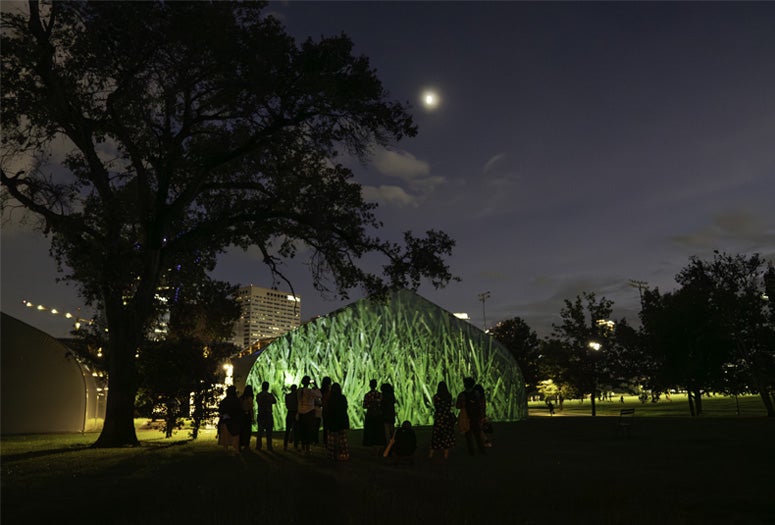
The installation of new temporary artwork at Rice University in the Moody Center for the Arts’ Tent Series presents an intriguing dialogue between architecture, social engagement and narrative form. In its fifth iteration, the series offers a platform for local artists to show their work for the entire academic year.
Among the two featured works for the 2024-25 season is “provision,” a site-specific installation by Sindhu Thirumalaisamy, an assistant professor of visual and dramatic arts at Rice. Thirumalaisamy’s work, known for engaging with public spaces and ecological concerns, takes the Provisional Campus Facilities (PCF) tent as its focal point, inviting viewers to reconsider how temporary spaces shape collective experiences and student interactions. Through her multimedia installation, Thirumalaisamy explores the liminal nature of the tent, not just as an architectural structure but as a social space.
“I think of this piece as a ‘tent-film,’ as a hyphenated word,” Thirumalaisamy said. “There’s something about it that’s both subject and object.”

This dual nature of the tent — both functional and symbolic — runs throughout “provision,” where Thirumalaisamy projects fleeting images onto the tent, reflecting materials such as tarps and culturally significant items. Through the use of vinyl outlines that trace the tent’s form and video projections that capture ephemeral human gestures, the artist investigates untold narratives, the passage of time and the sociopolitical histories embedded in these spaces.
Installed on the south side of Rice’s campus across Loop Road from Herring Hall, “provision” resonates with the history of the PCF tent, which has served as a space for student meetings, film screenings and concerts.
“This particular tent that the work is projected onto is the grad student bubble,” Thirumalaisamy said. “It’s a space for students on campus to meet, discuss things that are important to them, to organize. The work responds to the way in which that tent becomes a place for students.”
The work invites a gradual, ambient interaction.
“A student might catch a glimpse of something on their way in, see something on their way out, or perhaps see a part of themselves reflected in the images,” Thirumalaisamy said.
By making the installation both visually and conceptually fluid, Thirumalaisamy creates a piece that subtly responds to the environment and its daily rhythms. Ultimately, “provision” seeks to provoke thought about how spaces — especially those that seem temporary or transitory — create new possibilities.
“I want people to think about how places are made and the softness that produces new possibilities within seemingly rigid structures,” Thirumalaisamy said.
By integrating everyday objects and gestures with the physicality of the tent, Thirumalaisamy highlights how ordinary materials can challenge established boundaries and invite reflection on the future shaped by social interactions. As a member of the Rice faculty, her work follows Tent Series installations by colleagues Kenneth Tam, assistant professor of visual and dramatic arts, and Karin Broker, professor emerita of printmaking and drawing.

Alongside Thirumalaisamy’s “provision,” the Tent Series also features “La Tierra Recuerda,” a powerful installation by Lorena Molina. A visual artist and educator, Molina’s work explores themes of identity, memory and the consequences of war and displacement. Her piece reflects on the civil war in El Salvador, which forced her family to immigrate to the United States. “La Tierra Recuerda” centers on the lava fields of El Playon, a site used by paramilitary death squads during the war to abandon the bodies of civilians. Through this installation, Molina memorializes the dead and invites viewers to confront the traumatic history tied to the land.
“At the core of my work is an exploration of spatial inequalities and the challenges that oppressed groups face in constructing place and establishing a sense of belonging,” Molina said. “Most of my work stems from a need to find and build community in a way that is tender, accountable and sometimes challenging through difficult conversations that invite everybody involved to actively question their position and privileges in society.”
By spotlighting the silenced narratives of the past, Molina’s installation encourages viewers to reflect on the enduring impact of historical violence and how those events continue to shape the landscapes we inhabit today.
Previous local artists featured in this series include GONZO247, Robert Hodge, Allison Hunter, Hedwige Jacobs, Delita Martin, Preetika Rajgariah, Royal Sumikat, Sarah Welch, Charisse Pearlina Weston and Jasmine Zelaya.
This fifth round of commissions for the Tent Series will be on display until July 31, 2025. The tent installations are organized by Alison Weaver, Suzanne Deal Booth Executive Director, and curator Frauke V. Josenhans. Learn more about the Tent Series here.

